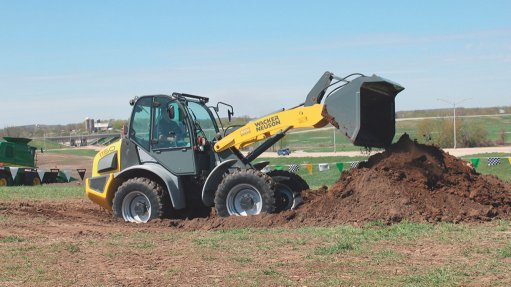
FIT FOR PURPOSE Dedicated machines can complete multiple actions, increase productivity as well as result in significant time and fuel savings
Amid South Africa’s increased focus on mechanisation, global construction equipment and compact machinery manufacturer Wacker Neuson will emphasise its compact range of machinery at this year’s Nampo Harvest Day.
The machinery that Wacker Neuson will showcase at Nampo – which will take place in Bothaville, in the Free State, from May 12 to 15 – includes dumpers, excavators, wheel loaders and telescopic handlers.
Farmers require manoeuvrable, high-performance machines that are efficient, economical and, more importantly, fit for purpose, Wacker Neuson MD Eugene Brown stresses, reiterating that the ideal models should be easy to use, require little maintenance and be inexpensive to operate.
“Farmers, in particular, are starting to understand that a general-purpose machine is not specific enough for certain tasks. For instance, a tractor with a front-end loader attachment is not an adequate digging machine, but rather a compromised loading machine,” he argues.
Brown, having told Engineering News last year that “farm sustainability and profitability depend on reduced operational and input costs”, reiterates these sentiments – he says that, as agricultural commodity prices have not increased in line with inflation in the past year, cost inputs are becoming a pressure point for farmers who are striving to better understand and control their costs while also pursuing scientific farming.
“Therefore, understanding the real benefits of true mechanisation, as opposed to just owning a larger fleet of equipment, and understanding how manufacturers, such as Wacker Neuson, can assist with this process optimisation, should be a key point of discussion for the agricultural community,” he highlights.
Dedicated, fit-for-purpose machines can increase produc- tivity and complete multiple actions, resulting in significant time and fuel savings, Brown emphasises. He notes that, in the drive towards mechanisation, farmers are also exploring offerings of the higher-kilowatt performance products, with an increasing demand for larger machinery.
“The local agriculture sector needs to increase its awareness and understanding of all the available opportunities,” he says, adding that Wacker Neuson is actively supplying wheel loaders to feedlots in the KwaZulu-Natal highlands, as well as to the dairy sector in the Western and Eastern Cape.
Brown further notes that rising labour costs and the uncertainty of tenure of land in the agriculture sector are key concerns fuelling the drive for mechanisation and efficiency.
During the 2015 State of the Nation address, President Jacob Zuma noted that, in terms of the proposed Regulation of Land Holdings Bill, “a maximum ceiling of 12 000 ha [will be imposed] on agricultural land owned by all legal and natural persons (including South Africans) and it is proposed that any agricultural land held by a single individual in excess of this maximum ceiling will be bought and redistributed by the State”, Creamer Media’s Polity reported in February.
Key Impact
Brown believes that other key discussions for the sector this year should include the ecological impact of machinery used on farms.
He cites many farmers’ continued use of basic engine technology, which consumes large amounts of diesel and, in turn, creates exhaust-soot-component contamination in the feeds.
These issues will come to the fore as South Africa pursues the impact of cheap engines and of implementing new engine technology, while the impact of current diesel and emissions standards on the diesel engines are also a necessary future concern, he says.
Wacker Neuson provides fuel- efficient engines that use between 3ℓ/h and 5 ℓ/h and are matched to the requirement of the machine, compared with conventional diesel tractors that use from 6 ℓ/h to 16 ℓ/h.
Debushing Project
Brown notes that Wacker Neuson will soon start an intensive debushing project in collaboration with a supplier of debushing attachments in the north of South Africa.
“There is substantial potential for farmers to unlock the potential of their land by removing invader species, such as sekelbos and lantana,” he says, noting that the company will also display the Wacker Neuson debushing machine, the 901 SP skid steer loader, which includes a Seppi flail cutter head, at Nampo.